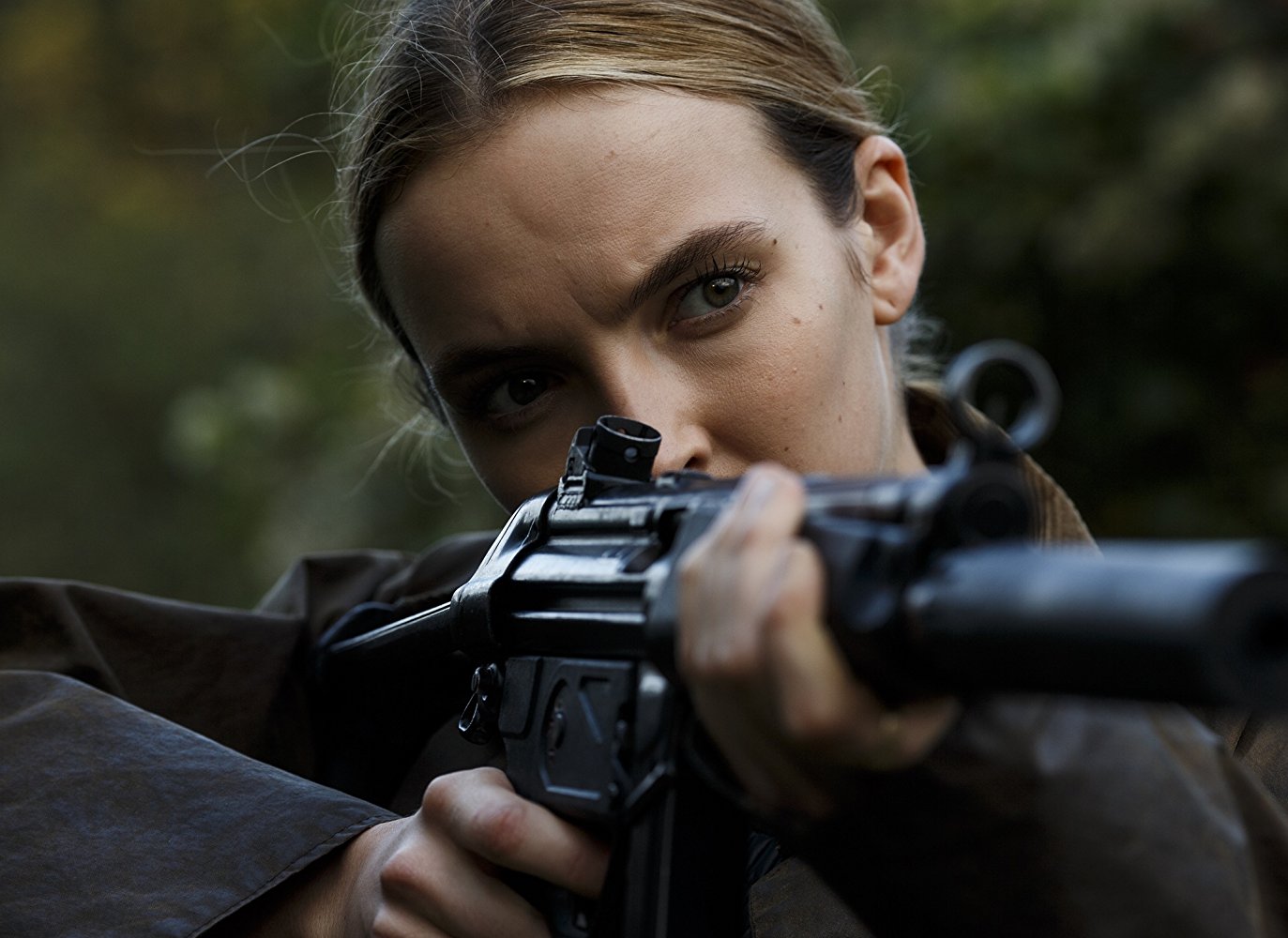 ★★★★
★★★★
“You should never call a psychopath a psychopath. It upsets them.”
 A genuinely organic hit on BBC America, this generated so much word of mouth that the ratings for this show behaved in an unexpected fashion. Including those who DVR’d the show, viewership increased for each episode over its 8-week run. That’s a rare feat these days, and is testament to the show’s unique qualities. So confident were the station in the show, that is was renewed for a second season before it had even premiered – another unusual achievement. But then, this show is arguably unlike anything else on television.
A genuinely organic hit on BBC America, this generated so much word of mouth that the ratings for this show behaved in an unexpected fashion. Including those who DVR’d the show, viewership increased for each episode over its 8-week run. That’s a rare feat these days, and is testament to the show’s unique qualities. So confident were the station in the show, that is was renewed for a second season before it had even premiered – another unusual achievement. But then, this show is arguably unlike anything else on television.
The heroine is Eve Polastri (Oh), an officer in the British intelligence service, MI-5, who believes there’s a connection between a string of assassinations across Europe. She’s right: they were all carried out be Oksana Astankova (Comer), codename “Villanelle”. Oksana is a pure, undiluted psychopath, working for a shadowy Russian organization known as “The Twelve”, under handler Konstantin Vasiliev (Bodnia). Polastri’s career is apparently ended when a witness to one of Oksana’s hits is killed in her care, and she’s fired from MI-5. However, this allows her to be recruited by Carolyn Martens (Shaw) for a off-book investigation into Villanelle.
Eve is therefore able to continue digging into Oksana’s history and activities, but the target becomes aware of the interest – signalling that knowledge by using “Eve Polastri” for her identity during a job. From here, it’s a spiral of increasingly intense cat-and-mouse, with Eve and her team tracking the assassin, while also being hunted by her. It all grows deeply personal for both Eve and Oksana, the two women developing a perverse long-distance relationship that’s more of a fixation, on both sides. Note: I’m not using “perverse” in relation to the homoerotic elements. It’s just… really bizarre. As in, “Villanelle breaking into Eve’s house, in order to have dinner with her” strange.
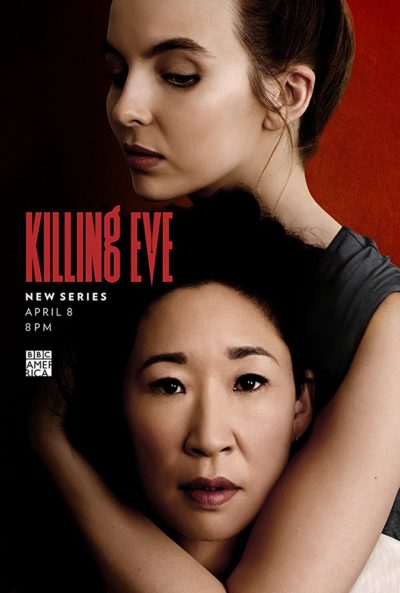 The show is defiantly messy in terms of its characters, who manage both to embody the stereotypes of the dogged law-enforcement official and the slick, femme fatale, while also subverting them. From the viewpoint of this site, Oksana is likely the more interesting. As a high concept, imagine a female version of Dexter: charming and affable on the surface, yet extraordinary lethal – and capable of flicking that switch in a moment. The difference is, Villanelle has chosen not to control and direct her “dark passenger” so much as embrace them fully, and is given the chance to do so by the profession into which she is recruited. It also allows her to indulge her fondness for haute couture.
The show is defiantly messy in terms of its characters, who manage both to embody the stereotypes of the dogged law-enforcement official and the slick, femme fatale, while also subverting them. From the viewpoint of this site, Oksana is likely the more interesting. As a high concept, imagine a female version of Dexter: charming and affable on the surface, yet extraordinary lethal – and capable of flicking that switch in a moment. The difference is, Villanelle has chosen not to control and direct her “dark passenger” so much as embrace them fully, and is given the chance to do so by the profession into which she is recruited. It also allows her to indulge her fondness for haute couture.
She enjoys her work, to an almost scary degree, disdaining the simplest and most directly effective methods, too. That’d be boring, especially for such a free spirit. Why shoot, when you can kill your target by stabbing them in the eye with a hatpin instead? On the other hand, she is also incredibly manipulative. Oksana may not be able to feel any genuine emotions of her own, yet she’s supremely good at faking them, and will happily say what you want to hear, if she thinks it’ll let her use you for her own advantage. Her handler doesn’t so much control the incredibly self-confident Villanelle as unleash her in the direction of the intended target. Who inevitably ends up dead… just not necessarily quite as he would prefer.
The contrast to Eve could hardly be greater, and that perhaps goes some way to explaining the agent’s obsession: Oksana is everything Eve wants to be. Okay, except for the “psychopathic killer” bit. But that’s just a detail, right? For Eve is stuck in a rather tedious relationship, and works a job where her talents are under-used and even less appreciated. The more she learns about her target, the greater the appeal seems to be, and it works both ways: Villanelle wants “someone to watch movies with”. Or says she does anyway: this could just be another manipulative ploy, it’s impossible to be sure. Espionage, counter-espionage and assassination is a murky world at the best of times. Here? You can’t see the murk for the deceit, and at times the lies become a bit overwhelming.
After a long career expressing earnest concern on medical soap Grey’s Anatomy, Oh’s career has undergone a spectacular sea-change of late. First, there was the awesome Catfight, and now this, little if any less successful, which allows Oh to show her remarkable range of expressive… er, expressions [Seriously: you could spend an entire episode just watching her face, to the exclusion of everything else, and still be entranced]. Comer is nowhere near as well-known, but I doubt we’ll see a more memorable female character on television this year than Oksana, combining childish innocence, girlish glee and savage psychopathy. When it comes to Emmy time, it will be a travesty if at least one of them is not nominated – and ideally both. The supporting cast are no slouches either.
I will confess to being less than whelmed by the final episode which, rather than ramping up, petered out into something approaching a slumber party. Admittedly, it’s a very weird one, befitting the show, and sees Eve violate Oksana’s personal bubble of living space, partly in retaliation for the same thing happening to her earlier. But it offers no sense at all of closure: this may be a side-effect of the show having been pre-renewed. I guess there’s no point making any effort to wrap things up, when you know you’re going to be back.
Still, for 7½ episodes, this was far and away the best thing on American TV at the moment. To get one of these amazing characters in a show would have been more than acceptable. Having both in the same series provides a one-two punch of heroine and anti-heroine that’s almost unsurpassed in television history. Buffy and Faith, or Xena and Callisto, perhaps come close – although they were only story arcs. Here, Eve and Oksana are a pure, undiluted focus, and it’s glorious. The second season can’t get here soon enough.
Creator: Phoebe Waller-Bridge
Star: Sandra Oh, Jodie Comer, Fiona Shaw, Kim Bodnia
 It’s not often that a film cost less to make, than the television set on which I watched it. But it appears this was the case here, with the budget reportedly coming in at five hundred pounds. No, there’s not a “thousand” missing from that. £500. What you get is probably not too far from what you would expect for that – some of the aerial photography and locations do appear to represent good value for money. Budget isn’t the real issue here though. This British film’s main problem is the drastic shift in story for the final third, when it suddenly morphs, for no reason, from a SF/thriller, into a full-on zombie apocalypse which the makers have neither the budget nor the talent to depict.
It’s not often that a film cost less to make, than the television set on which I watched it. But it appears this was the case here, with the budget reportedly coming in at five hundred pounds. No, there’s not a “thousand” missing from that. £500. What you get is probably not too far from what you would expect for that – some of the aerial photography and locations do appear to represent good value for money. Budget isn’t the real issue here though. This British film’s main problem is the drastic shift in story for the final third, when it suddenly morphs, for no reason, from a SF/thriller, into a full-on zombie apocalypse which the makers have neither the budget nor the talent to depict.




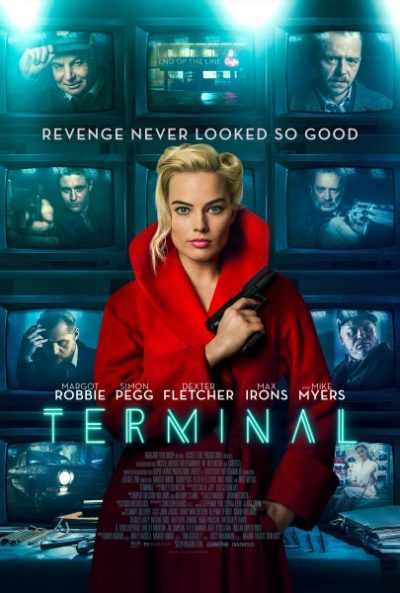 Oozing with a unique visual style that’s like a brutalist cross between Blade Runner and Alice in Wonderland, this focuses on a battle for business between assassins. Annie (Robbie) – or, maybe, she’s called Bonnie – wants to take over the murderous commissions of the mysterious Mr. Franklin. He agrees, only if she takes out the current incumbents, Vince (Fletcher) and his apprentice, Alfred (Irons). Simultaneously, while working as a waitress in an all-night diner at a railway station, she meets Bill (Pegg), a terminally-ill English teacher, who enters her establishment while waiting for a train in front of which to throw himself.
Oozing with a unique visual style that’s like a brutalist cross between Blade Runner and Alice in Wonderland, this focuses on a battle for business between assassins. Annie (Robbie) – or, maybe, she’s called Bonnie – wants to take over the murderous commissions of the mysterious Mr. Franklin. He agrees, only if she takes out the current incumbents, Vince (Fletcher) and his apprentice, Alfred (Irons). Simultaneously, while working as a waitress in an all-night diner at a railway station, she meets Bill (Pegg), a terminally-ill English teacher, who enters her establishment while waiting for a train in front of which to throw himself.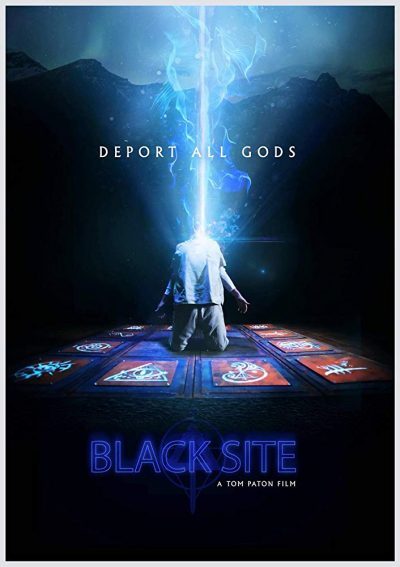 This Lovecraftian-inspired action/horror mix is full of good – or, at least, interesting – ideas. It plays almost like a Call of Cthulhu scenario, with the players having to defend the top-secret government facility of the title from a group of cultists who are attacking the base. They are aiming to liberate one of the Elder Gods, Erebus, who in the form of the human he has possessed (Johnson), is about to be deported back into the infinite darkness. This is the latest incident in an ongoing covert battle by humanity, which has been going on since the twenties, though with decreasing intensity. At least until now.
This Lovecraftian-inspired action/horror mix is full of good – or, at least, interesting – ideas. It plays almost like a Call of Cthulhu scenario, with the players having to defend the top-secret government facility of the title from a group of cultists who are attacking the base. They are aiming to liberate one of the Elder Gods, Erebus, who in the form of the human he has possessed (Johnson), is about to be deported back into the infinite darkness. This is the latest incident in an ongoing covert battle by humanity, which has been going on since the twenties, though with decreasing intensity. At least until now.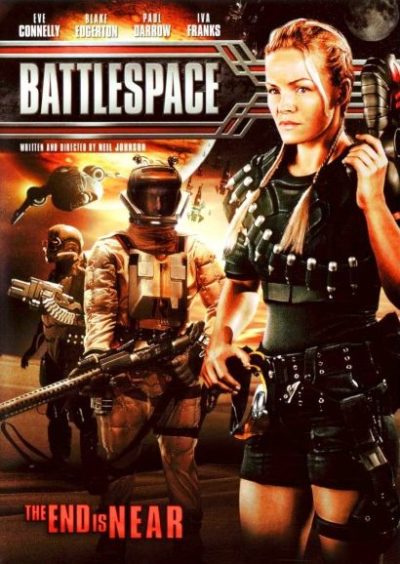 This dates back to 2006, and was somewhat groundbreaking at the time, due to the very high volume of digital effects and CGI background work – it came out was three years before Avatar, as a yardstick. The key word here, however, is “volume”. For the effects make up for in quantity what they largely lack in quality, although you have to be impressed at the sheer ambition on view, especially when you don’t have a fraction of the resources which were available to James Cameron. More problematically, also missing is the skill necessary to handle a narrative, where there is simultaneously too much and not enough going on. The former is apparent in entire universe building which has to be accomplished in hard to digest expository chunks, and the latter makes itself known, courtesy of long stretches which are as devoid of interesting features as the Arizona landscapes in which they were shot.
This dates back to 2006, and was somewhat groundbreaking at the time, due to the very high volume of digital effects and CGI background work – it came out was three years before Avatar, as a yardstick. The key word here, however, is “volume”. For the effects make up for in quantity what they largely lack in quality, although you have to be impressed at the sheer ambition on view, especially when you don’t have a fraction of the resources which were available to James Cameron. More problematically, also missing is the skill necessary to handle a narrative, where there is simultaneously too much and not enough going on. The former is apparent in entire universe building which has to be accomplished in hard to digest expository chunks, and the latter makes itself known, courtesy of long stretches which are as devoid of interesting features as the Arizona landscapes in which they were shot.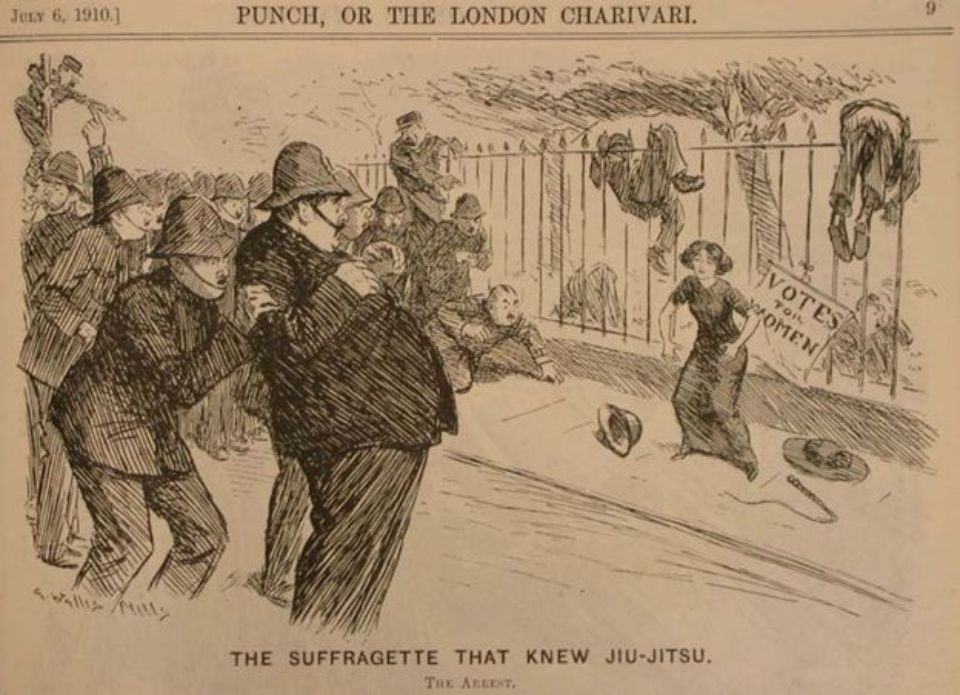
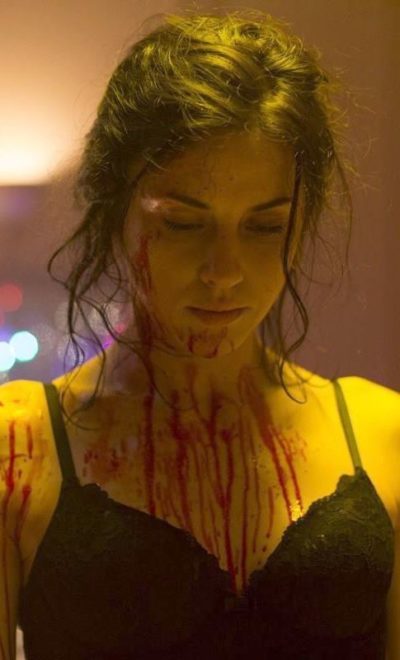 Oh, be afraid… Be
Oh, be afraid… Be  This slice of British televisual fantasy was offered up on Christmas Day, and provides a pleasant, warm and unchallenging slice of family fare. It takes place in a world where magic has ruled, but is gradually fading from consciousness and being replaced by technology. The magic appears connected to the dragons with which humanity shared the planet, uneasily. After previous battles, a kind of apartheid was set up, with the world divided into dragon and human areas. Overseeing the peace is the Dragonslayer, who is charged with killing any dragons who violate the treaty and attack humans or their territory. But some members of mankind are casting envious eyes on the unspoiled territory of the dragons, and would love an excuse to take it over.
This slice of British televisual fantasy was offered up on Christmas Day, and provides a pleasant, warm and unchallenging slice of family fare. It takes place in a world where magic has ruled, but is gradually fading from consciousness and being replaced by technology. The magic appears connected to the dragons with which humanity shared the planet, uneasily. After previous battles, a kind of apartheid was set up, with the world divided into dragon and human areas. Overseeing the peace is the Dragonslayer, who is charged with killing any dragons who violate the treaty and attack humans or their territory. But some members of mankind are casting envious eyes on the unspoiled territory of the dragons, and would love an excuse to take it over.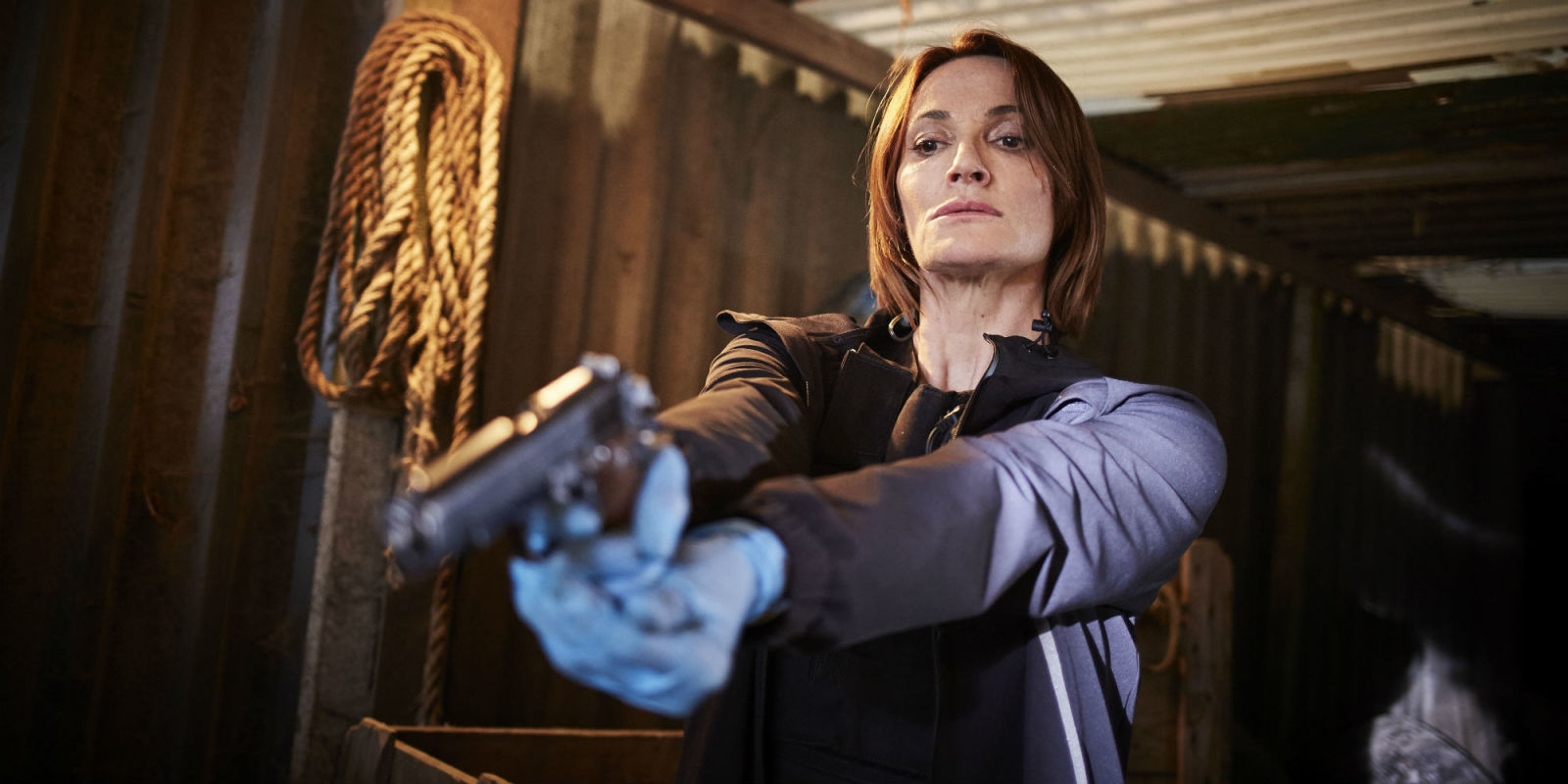 ★★★½
★★★½ ★★★★
★★★★ A genuinely organic hit on BBC America, this generated so much word of mouth that the ratings for this show behaved in an unexpected fashion. Including those who DVR’d the show, viewership increased for each episode over its 8-week run. That’s a rare feat these days, and is testament to the show’s unique qualities. So confident were the station in the show, that is was renewed for a second season before it had even premiered – another unusual achievement. But then, this show is arguably unlike anything else on television.
A genuinely organic hit on BBC America, this generated so much word of mouth that the ratings for this show behaved in an unexpected fashion. Including those who DVR’d the show, viewership increased for each episode over its 8-week run. That’s a rare feat these days, and is testament to the show’s unique qualities. So confident were the station in the show, that is was renewed for a second season before it had even premiered – another unusual achievement. But then, this show is arguably unlike anything else on television. The show is defiantly messy in terms of its characters, who manage both to embody the stereotypes of the dogged law-enforcement official and the slick, femme fatale, while also subverting them. From the viewpoint of this site, Oksana is likely the more interesting. As a high concept, imagine a female version of Dexter: charming and affable on the surface, yet extraordinary lethal – and capable of flicking that switch in a moment. The difference is, Villanelle has chosen not to control and direct her “dark passenger” so much as embrace them fully, and is given the chance to do so by the profession into which she is recruited. It also allows her to indulge her fondness for haute couture.
The show is defiantly messy in terms of its characters, who manage both to embody the stereotypes of the dogged law-enforcement official and the slick, femme fatale, while also subverting them. From the viewpoint of this site, Oksana is likely the more interesting. As a high concept, imagine a female version of Dexter: charming and affable on the surface, yet extraordinary lethal – and capable of flicking that switch in a moment. The difference is, Villanelle has chosen not to control and direct her “dark passenger” so much as embrace them fully, and is given the chance to do so by the profession into which she is recruited. It also allows her to indulge her fondness for haute couture. I’m unsure who the woman is on the DVD sleeve. I can only presume it’s Lady Not-Appearing-In-This-Film. For what we have instead seems to be a real labour of love for British stunt-woman Cecily Fay. Though calling her a mere stunt-woman would be selling her short: she also wrote, directed, starred in, edited and scored this feature, plus did the fight choreography and sound re-recording, while sewing every sequin on the costumes herself. Okay, the last might be a bit of a stretch, but since she is also credited as the costume designer… perhaps not. Hell, even Robert Rodriguez doesn’t have such a large collection of hats, and this overwhelming multi-tasking might help explain why it took close to five years between the start of filming and its eventual release. The main problem is that Fay’s talents, while considerable, are not equally spread.
I’m unsure who the woman is on the DVD sleeve. I can only presume it’s Lady Not-Appearing-In-This-Film. For what we have instead seems to be a real labour of love for British stunt-woman Cecily Fay. Though calling her a mere stunt-woman would be selling her short: she also wrote, directed, starred in, edited and scored this feature, plus did the fight choreography and sound re-recording, while sewing every sequin on the costumes herself. Okay, the last might be a bit of a stretch, but since she is also credited as the costume designer… perhaps not. Hell, even Robert Rodriguez doesn’t have such a large collection of hats, and this overwhelming multi-tasking might help explain why it took close to five years between the start of filming and its eventual release. The main problem is that Fay’s talents, while considerable, are not equally spread.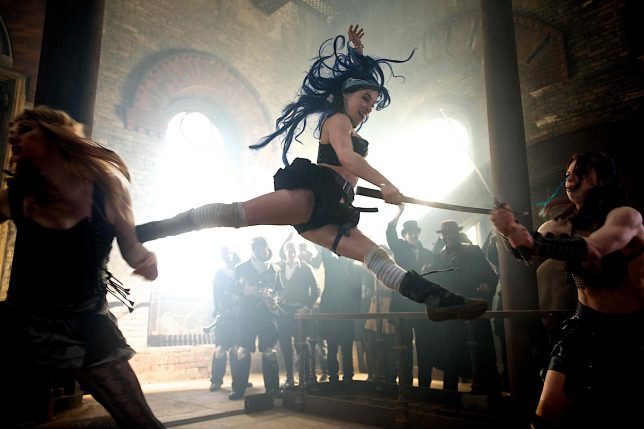 More positively, we have Fay’s acting and directorial talents. The former isn’t much of a surprise, as I enjoyed her performance in
More positively, we have Fay’s acting and directorial talents. The former isn’t much of a surprise, as I enjoyed her performance in